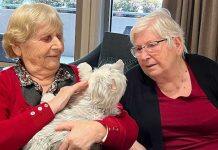

Massey University scientist Professor David Hayman has been named the Manawatu Standard’s Person of the Year 2020 for his work studying the coronavirus and for being a local source of information for the public about Covid-19.
A world-leading infectious disease specialist and senior lecturer in Massey’s Institute of Veterinary, Animal and Biomedical Sciences, Professor Hayman has spent much of his career studying the Ebola virus, as well as the relationship between viruses and how they are spread between animals and humans (zoonotic transmission), with a particular focus on bats. Scientists suspect the latest coronavirus most likely crossed to humans from bats, which have been the source of several viruses harmful to humans, including Ebola.
So, when the COVID-19 outbreak began unfolding and the world was grappling with where the virus came from and what the pandemic could mean, international and national media turned to Professor Hayman for possible answers.
COVID-19 research ongoing in 2021
Commenting on the recognition from Stuff media’s Manawatū newspaper, Professor Hayman says he spoke with different journalists a lot last year. “They do an excellent job here in New Zealand, so it was nice to receive some recognition from them, though I was a little surprised and certainly not expecting any recognition at all. I think there are a lot of very deserving people that go unrecognised.”
Regarding 2021, he “looks forward to the increased use of the different vaccines that are increasingly being shown to be safe and effective to prevent disease and, hopefully, transmission.
“However, I think people tend to forget that actually – at least globally – we are still in the early days of this pandemic. Even in the most heavily-impacted countries, only a relatively small proportion of people have been infected. I think we are very lucky here in New Zealand because so far we have been able to control the infection without the vaccine, but given the prevalence of the virus elsewhere we need to remember there may still be the occasional outbreak here and we will need to be patient and vigilant.”
In 2021 Professor Hayman hopes to continue to work with the international agencies; “on both how and where this virus emerged as well as work towards better ways of preventing future outbreaks, particularly through how we as people engage with nature, because there are a huge number of diverse viruses out there.”
Global report on pandemic big picture
Professor Hayman co-directs the Molecular Epidemiology and Public Health Group in the School of Veterinary Science and is a Royal Society Te Apārangi Rutherford Discovery Fellow.
In November last year he co-authored #PandemicsReport: Escaping the Era of Pandemics, after being selected as one of 22 global experts to contribute to the report that was published by Intergovernmental Science-Policy Platform on Biodiversity and Ecosystem Services (IPBES) and shared with more than 130 governments. He was the only New Zealand-based researcher to contribute to the report, which was about what humans are doing to the natural world.
It outlined how situations such as rainforest loss led to the emergence of infections, including Covid-19, and what could be done to stop it happening. The authors are also hoping the general public will read it too and learn that individuals can also make a difference.
The report makes several recommendations, including: developing and incorporating pandemic and emerging disease-risk health impact assessments in major development and land-use projects; ensuring that the economic costs of pandemics are factored into governments’ policies and budgets; reducing or removing high disease-risk species in the wildlife trade; and valuing Indigenous Peoples and local communities’ knowledge and engagement in pandemic prevention programmes.
“The first step [of the report] was to make the link between processes that are leading to biodiversity crisis and disease emergence and look at the factors that cause infections to go from wildlife to people. Then we looked at what is causing pandemics and where they come from,” he said.
“We wanted to explain to governments, ‘this is why it’s failing to date and these are the measures we think you need to consider, to stop these in the future’.”








































